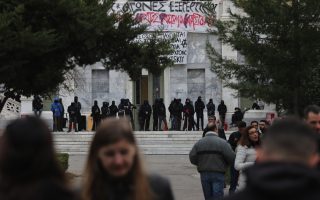Ancestral purity or genetic mirage? The case of Macedonia

The year 2018 has transformed relations between Greece and the Former Yugoslav Republic of Macedonia (FYROM). The Prespes agreement, signed on June 12, attempts to resolve the Macedonia name dispute, so that Greece will permit FYROM entry to the European Union and to NATO. It was followed by a vote by the FYROM Parliament on September 30 to change its name to “North Macedonia.” Direct flights between the two capitals started on November 1.
The Yugoslavian state of Macedonia became independent in 1993 under the name “Former Yugoslav Republic of Macedonia.” Greek governments have been opposed to the inclusion of the term “Macedonia” in the country’s name. They argue that FYROM citizens are Slavs who speak a Bulgarian dialect, unlike the ancient Macedonians who were Greek and spoke a Greek dialect. Alexander the Great could not possibly be related to Slavs, who moved to the region in the 6th century AD.
The moves to solve the impasse have been met with resistance in both countries. FYROM is informally called Macedonia, and its citizens resent the change of name. Nationalist sentiments are fueled by an onslaught of fake and distorted news, aimed at stoking mutual anger and distrust. The drums of war are rolling, and some Greeks could try to defend their besmirched honor in the abducted name of Macedonia, as if the region were Helen of Troy.
But what if Helen were a mirage? The ancient playwright Euripides developed the scenario that “Eleni” had never been in Troy; the gods had placed an idol in her place. The famous Nobelist George Seferis used the metaphor to argue that thousands of people died fighting for an “empty shirt.”
The metaphor is again apt. The spoiler gods are the DNA codes of the inhabitants. They ride on a chariot of genomics, a biology branch aimed at decoding the human genome and its variations. And they dispel myths of ancestral purity and direct descendance from glorious men. This is story that emerges.
Homo sapiens settled Europe in about three migration waves. The first wave came from Africa about 43,000 years ago; the men were hunters and the women were gatherers of plants. They were gradually displaced or absorbed by a second migration, 9,000 years ago, that came from the Near East. These Neolithic-age settlers were farmers with families who merged with the first wave.
About 5,000 years ago, a third migration wave originated from the Caucasus Mountains. Perhaps 90 percent of the migrants were men, who were herders and rode horses. They were warlike and bred with local women, either by force or by choice. They mainly spoke Indo-European languages that morphed into Greek, Illyrian, Thracian, Phrygian and others. In Macedonia and Epirus these tribes settled near each other and intermarried. According to ancient historians (Strabo), many residents were bilingual in the 4th century BC.
Philip II and his son, Alexander the Great, descended from mixed families and also married non-Greek women. Contemporary FYROM was inhabited mainly by Paionians, who allied themselves with Athens and were militarily subjugated by Philip. Paionians seem to have become eventually Roman citizens. (A 5th century AD Paionian resident wrote in Greek.) Furthermore the borders of an entity called “Macedonia” changed multiple times over the centuries.
Tribal migrations continued for the next 1,500 years or so, bringing Germans, Slavs and ultimately Turks to Europe. Like the earlier Indo-Europeans, the Slavs were numerous and fought hard, so they appear to have been mainly males. Research from Poland and elsewhere suggests that Slavs married local women, whose maternal lineage descended from the second migration wave. So on one hand, the male Macedonians of the 4th BC century may be only remotely related to the male Slavs of the 6th century AD. But on the other, the mothers of both ethnicities have been largely in Europe since the Neolithic era. Women may have changed ethnicity, language and religion, but the mitochondrial DNA points to the origin.
More research is under way, but existing DNA analyses show similar distributions of haplogroups in Greece and FYROM. Thus it can be roughly stated that Greeks and FYROM citizens are closely related at least on the maternal side.
Furthermore, a lack of relationship is impossible, even on the paternal side. The earth around the start of the Common Era numbered perhaps 300 million humans, and today’s 8 billion descend from them. In fact mathematical ancestry estimates suggest common ancestors for entire countries. Thus, it seems genetically impossible to distinguish Greek Macedonians from FYROM citizens.
So the belief that ancient Macedonia was exclusively Greek is a mirage. In their most glorious moments, the Macedonian men and women shared the space with Illyrians, Paionians, Thracians, Celts, Phrygians and others. And surely many of them spoke the languages of their neighbors and relatives.
Science changes the discourse about Macedonia. Can the two sides use it to overcome folk beliefs? There are huge political and environmental issues that must be jointly tackled. If globalist Alexander were alive, he might advise both sides to ignore provocations and the empty shirt of racial purity. Probably everyone born in the region shares ancestors with him. Greece and North Macedonia can best honor him by forming a lasting alliance.
Helen Abadzi is a Greek educational psychologist and a former employee of the World Bank. This essay represents the author’s views.





